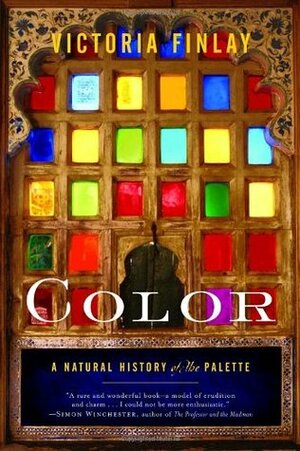
Colour: Travels Through the Paintbox
by Victoria Finlay
Genres: History, Non-fiction, SciencePages: 494
Rating:

Synopsis:Discover the tantalizing true stories behind your favorite colors.
For example: Cleopatra used saffron—a source of the color yellow—for seduction. Extracted from an Afghan mine, the blue “ultramarine” paint used by Michelangelo was so expensive he couldn’t afford to buy it himself. Since ancient times, carmine red—still found in lipsticks and Cherry Coke today—has come from the blood of insects.
Victoria Finlay’s Colour: Travels through the Paintbox is an examination of dyes and pigments, rather than colour per se — there’s a bit of discussion of why we perceive colours the way we do, but not in depth. It’s more about how various pigments are mined or made, and it’s also part travelogue and part-memoir. The fact that Finlay couldn’t get coffee in Beirut because of Hafez al-Assad’s funeral is neither here nor there, as with the fact that she wore a broken boot to climb in and had to keep tying it together with string. The book could probably do without a great deal of this flavouring, since it slows it all down.
But, viewed as Finlay’s account of a personal quest to discover the origins of a handful of colours — neither exhaustive nor greatly in depth, in many ways — there’s definitely a lot of interest here: random facts, suggestive examples of tradition that may tell us something about how things used to be done, and an idea of how things are done now. Sometimes Finlay’s choices were more about some kind of personally satisfying quest than about really understanding a colour: were her quests for visas really about the colour, or about being able to say she’d visited a mine in Afghanistan?
I guess I feel a bit cynical about some of her motivations because I’m not the type who must necessarily go and see a thing to say I understand it. When she tried to pick saffron, that was an experience worth having to understand the process — but did she need to travel so far? Does one have to see the “original” place where indigo grew to understand indigo?
It’s very readable and full of anecdotes and imagination, to the point where I couldn’t really say it’s a good read to learn about colour. It’s a good read to understand someone else’s journey to personally discover the origins of a handful of pigments and dyes. It does have a bibliography and full footnotes, too, but primarily it’s about how Finlay feels about colour, and the stories she discovered (and liked enough to recount). That can be very enjoyable, it’s just worth bearing in mind.
Rating: 3/5
